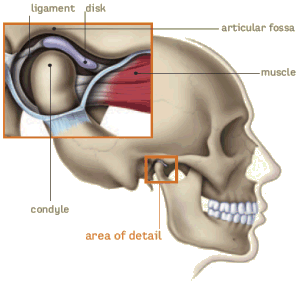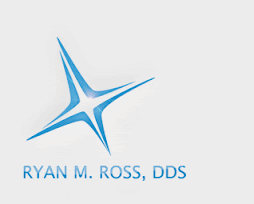Clenching and Grinding – TMJ
By Ryan Ross, DDS

Most people have heard the abbreviation “TMJ”. This stands for tempromandibular joint and every person has two of them. These are the joints of your jaw, located right in front of your ears. If you clench or grind your teeth this is called bruxism or TMD (tempromandibular disorder). Most clench or grind at night while they sleep, but it often becomes habit during the day as well.
Symptoms of this disorder vary, ranging from minor to severe and can include one or more of the following: tooth pain, excessive tooth wear, loose teeth, jaw muscle pain, TMJ or ear pain, frequent headaches, neck pain, “clicking” or “popping” sounds in the TMJ, and or the jaw gets “stuck” when opening or closing.
Often the cause of bruxism is unknown, but most times it is believed to be from something all of us have; STRESS. Stress can be emotional, environmental, or physical due to jaw misalignment, scar tissue, or trauma. The most common traumas to effect the jaw include motor vehicle accidents, head injuries, blows to the jaw, infections, and more. This explains why estimates are that about one third of the population suffers from some degree of TMJ.
If you think you are clenching or grinding or you’ve been exposed to any of the above stressors you should ask your dentist what treatment options are best for you. The most common dental treatment is called an occlusal appliance, often referred to as a night guard, bite guard, or occlusal splint. These are a hard or soft acrylic devices worn usually at night over the teeth of either the upper or lower arch. They prevent excessive wear of teeth and take much of the strain away from the TMJ and muscles of opening and closing, therefore alleviating pain.
Other treatments available are Chiropractic, physical therapy, pain medications, ice, heat , or massage. We refer many of our patients to Drs. Rex & Molly Stevens, Chiropractors who with a gentle touch assist patients in restoring jaw mechanics with mild adjustments to the TMJ or cervical spine and use myofascial release techniques on supporting muscles to minimize inflammation, decrease scar tissue, and eliminate muscle spasm. Finally, rest is important so avoid hard or sticky foods and especially chewing gum. In some extreme rare cases a surgical procedure may be required.
Thanks to Dr. Ross for his continued support of our patients oral hygiene. It is a pleasure to continue to work with Doctors like him who understand how important it is to collaborate with colleagues in different health fields to better improve patient health outcomes! – Dr. Rex
541-5800
567 Marsh St.
SLO, CA 93401


















0 comments:
Post a Comment